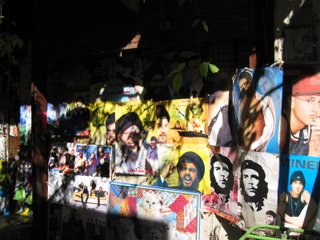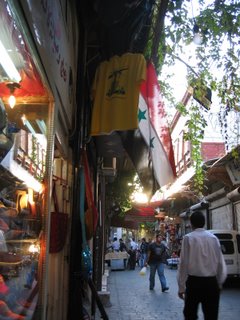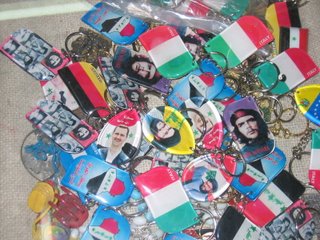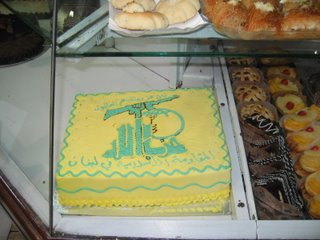Che Guevara in the Middle East

The support for Hizballah here in Damascus is, not surprisingly, quite strong. Hizballah is seen as a group fighting for Arab rights against American and Israeli designs to control the region. Although there is not as much popular support for the Syrian government and the system it implements, the President himself also garners support for his foreign policy stance against what is seen as American bullying. So I wasn’t at all taken aback by the prevalence of Hizballah signs, flags, posters, and graffiti that I have seen around Damascus.
I was more amused by the popularity of older revolutionary symbols that are found side-by-side Hizballah paraphernalia. Che Guevara’s struggling face is seen juxtaposed with Nasrallah around the city, and his likeness can be found displayed on its own as well, hanging from a balcony, or on a young man’s t-shirt.
 Old City souq.
Old City souq.
I walked into a shop in the Old City that was selling Hizballah t-shirts to ask them about the phenomenon. The shop owner and his two friends sitting inside explained to me that “Every generation has a hero. Che was from the older generation, and now this generation has found theirs.” “Nasrallah?,” I asked. “Mmm, yes, but even more so this guy,” as he pulled out a keychain with President Chavez of Venezuela from his display case. I laughed. “Why Chavez?” He said “You know, there is a joke going around, we call him Abu Ali, because he is the most Arab of all the Arabs.” What he meant is that Chavez, like Bashar and Nasrallah and Guevara, defies American requests to shape his country’s policies to the benefit of the US.
 A pastiche of keychains.
A pastiche of keychains.
 Hizballah motif cake in Bab Touma, a Christian area of the Old City.
Hizballah motif cake in Bab Touma, a Christian area of the Old City.
I should also note that Hizballah’s popularity is certainly not limited to the Shi’i or even the Muslim areas of the city. One associate commented that Hizballah paraphernalia seems even more prevalent in Christian areas. Perhaps this is true, but the fact that Hizballah’s support is not limited by sectarian identity points even more strongly to the fact that the party is seen by Arabs belonging to different religious communities as representing their shared political interests against dominating forces. Arabs like strong defiant leaders, whether they are Shi’i from Lebanon or Venezuelan. Another possibility, though, is that Christians here feel the need to display their solidarity with the majority Muslim community. I don’t think, however, that this is a disingenuous display of support, even if other observers have noted that Christians in Syria are frightened by the prospect of being dominated by a Muslim government and are more happy to live under a minority regime that might protect them. Next time I pass by I’ll ask the Christian shop owner if he is at all frightened by the Islamic character of Hizballah.

7 Comments:
Our che dear che viva revolution viva socialism.
Fight against american imperialismthrough the path of che .Love the eternity of che
All about che:
"What is now happening to Marx's theory has, in the course of history, happened repeatedly to the theories of revolutionary thinkers and leaders of oppressed classes fighting for emancipation. During the lifetime of great revolutionaries, the oppressing classes constantly hounded them, received their theories with the most savage malice, the most furious hatred and the most unscrupulous campaigns of lies and slander. After their death, attempts are made to convert them into harmless icons, to canonize them, so to say, and to hallow their names to a certain extent for the ‘consolation' of the oppressed classes and with the object of duping the latter, while at the same time robbing the revolutionary theory of its substance, blunting its revolutionary edge and vulgarizing it."
http://www.marxist.com/forty-years-death-che-guevara091007.htm
Fuck the middle east, they must remember Che Guevara fought his life for only latin america. The middle east and Latino America are totally different and will never be the same. We dont care whats going on in the middle east. We have to protect our own home before we help anyone else. SEREMOS COMO CHE, HASTA LA VICTORIA SIEMPRE! No middle eastern knows what that means...
I love your page all that talk about this character that was very revolutionary for the time helped me
They like him because they admire the strongman who values power over innocent life.
From and essay by a professor of history and political science at Gainesville State University:
"The real Guevara was a reckless bourgeois adrenaline-junkie seeking a place in history as a liberator of the oppressed. But this fanatic’s vehicle of “liberation” was Stalinism, named for Soviet dictator Josef Stalin, murderer of well over 20 million of his own people. As one of Castro’s top lieutenants, Che helped steer Cuba’s revolutionary regime in a radically repressive direction. Soon after overthrowing Batista, Guevara choreographed the executions of hundreds of Batista officials without any fair trials. He thought nothing of summarily executing even fellow guerrillas suspected of disloyalty and shot one himself with no due process.
Che was a purist political fanatic who saw everything in stark black and white. Therefore he vociferously opposed freedoms of religion, speech, press, assembly, protest, or any other rights not completely consistent with his North Korean-style communism. How many rock music-loving teens sporting Guevara t-shirts today know their hero supported Cuba’s 1960s’ repression of the genre? How many homosexual fans know he had gays jailed?
Did the Obama volunteers in that Texas campaign headquarters with Che’s poster on the wall know that Guevara fervently opposed any free elections? How “progressive” is that?"
You can find the rest of the truth here
Anyway, I am adding this RSS to my email and could look out for much more of your respective interesting content. Make sure you update this again soon.
EZ Flash IV
It's interesting how different generations find heroes who inspire them.
Post a Comment
<< Home